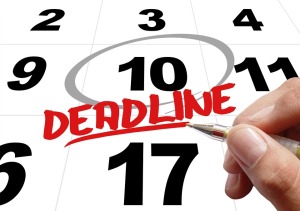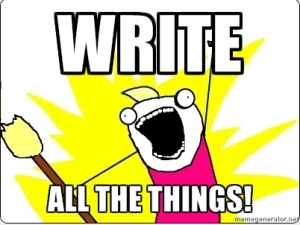Now that Season 1 of Jack Hansard is complete, this seems like a good time to take a step back and reflect on the lessons I’ve learned over the past year and a bit. I’ve made plenty of mistakes, and the beautiful thing about mistakes is that they cause you to evaluate the way you work and the way you write. And, crucially, they make you figure out how to do it better next time.
So I present to you the mistakes I made and the lessons I learned from them. Although Jack Hansard is only a free series I publish for fun, these same lessons are applicable to all kinds of serial or episodic writing. Whether you’re publishing webcomics, writing weekly articles for an online magazine, maintaining a daily blog, serialising your novel or working on a short story series, I hope you find some useful pointers here.
Give yourself enough time to write.
I gave myself two weeks to write each Jack Hansard episode. It was just enough time to fit in around my job. I know there are writers out there who seem to be able to churn out a thousand words a day on top of working 40 hours a week, but I’m not one of them. And that’s okay. The important thing is to know your limits, and my limit is one Jack Hansard episode – or about 4000 words – per fortnight. Any more than your limit, and you run the risk of burning out.
You should also consider the quality of your work. Two weeks is the minimum I needed to write an episode, with full proof read and some minimal editing before it was published. And no matter how hard I tried, it was never, ever perfect. Because of course it’s not. For a perfect short story, ideally you want to leave it a few days, and then come back and re-do the whole shebang. The question is how important ‘perfect’ is to you.
At first, I was okay with imperfect – Hansard’s journey was intended as more of a training exercise from my perspective, a challenge to write consistently and meet deadlines. But as the story and characters grew, I grew endlessly attached to them and wanted to do them greater justice. I have made countless edits to the Jack Hansard stories – cleaning up the little niggles, polishing here and there – but it still frustrates me that I can’t pull it all down and piece it back together so that’s it becomes even better. If I were to rewind, I would give myself at least a month to write each episode, and I’d spend more time working out how they all intertwined in the wider scheme of things.
So before you set off on your episodic journey, before you publish anything and set the clock ticking, take some time to work out how long each episode, article, or strip will take you to produce – and make peace with the schedule you set yourself, because later on you’re gunna have a lot of fights with that bastard.
Once you’ve worked out your time-table, stick to it.
 I’m quite proud that I met my fortnightly deadline most of the time, even if it did result in a few episodes I wished I’d spent more time on. It proved to me that I really could work under pressure and still produce something of a decent quality.
I’m quite proud that I met my fortnightly deadline most of the time, even if it did result in a few episodes I wished I’d spent more time on. It proved to me that I really could work under pressure and still produce something of a decent quality.
I found my biggest set-backs came when I took some time off. Now, sometimes this is very necessary – in my case there was a funeral to attend, there was a massive adventure in Belgium, and there was Christmas reserved for friends and family. There’s no reason not to take these times off – if anything, I’d recommend that you build a holiday into your timetable so that you don’t burn out during periods you know you’ll be too busy to fully commit. But where I went wrong was in not setting a proper ‘return-to-work’ date. Particularly after Christmas, this was a deep holiday hole I fell down where a long stint away from writing the series left me very complacent and lacking enthusiasm.
My key advice would be to keep your holidays short. And just because you’re having time away from the series, doesn’t mean you should have time away from writing altogether. Try using the time to pursue other projects, or enjoy writing just for the sake of it – anything to keep your eye in.
And how can you make your brief holidays easier on both yourself and your readers?
Get started before you start.
 Before I launched An Inspired Mess and Jack Hansard, I’d already written the first two episodes to give myself a head start. And, even more cunningly, I’d written two future stories (which became Episodes 11 and 16, both sparking their own sub-plots lasting several very fun installments).
Before I launched An Inspired Mess and Jack Hansard, I’d already written the first two episodes to give myself a head start. And, even more cunningly, I’d written two future stories (which became Episodes 11 and 16, both sparking their own sub-plots lasting several very fun installments).
These future episodes were there to give me breathing space, to cover my ass if I couldn’t finish the time-tabled episode in time, in case a family emergency came up, and to provide content during my planned ‘holiday’ in the middle of the series.
All very good in theory. My mistake: I didn’t use my breathing space. I should have kept at least one episode ahead, but I didn’t. If I had, there wouldn’t have been month-long gaps in the summer and winter where nothing was uploaded.
So make sure you have several stories or articles written before you publish the first one, and save one or two for those unexpected gaps that will undoubtedly crop up.
On the subject of planning . . .
Keep notes.
 Other people might say ‘make plans’, but I say that’s up to you. Best-laid plans work for some, and the advantages of knowing the plot in advance are obvious. But I’m someone who prefers to plan off the cuff – I’ve the rough plot for the next three episodes, and a vague sense of the overarching story, but I don’t want to be hemmed in by details. The brilliant thing about a short story series is that some very unexpected details can unfold if you just go with the flow and allow the series to take a different direction from time to time.
Other people might say ‘make plans’, but I say that’s up to you. Best-laid plans work for some, and the advantages of knowing the plot in advance are obvious. But I’m someone who prefers to plan off the cuff – I’ve the rough plot for the next three episodes, and a vague sense of the overarching story, but I don’t want to be hemmed in by details. The brilliant thing about a short story series is that some very unexpected details can unfold if you just go with the flow and allow the series to take a different direction from time to time.
But if you don’t write plans, write notes. These are those unfolding details that might become very important later. So you just introduced a side-character who you whimsically gave a sense of humour that revolves entirely around fish puns . . . five stories later a joke about a haddock might end up the turning point of the whole plot. Or perhaps it’s the colour of his eyes? Her eyes? Damn, where did our main character meet this person again?
Going over these little details can also help you in times of Writer’s Block, as well as in tightening your overarching storyline. If you’d forgotten that one particular character loved fish puns, reading over the notes could spark that very turning point in the plot.
I was a lousy note-taker, and I wish I’d created a binder full of them for easy reference. Instead I found myself leafing through the hand-written drafts and scanning the published episodes for references to personality quirks and physical descriptions I couldn’t quite recall. In particular, the way Ang speaks – I was constantly referring to the Coblyn’s previous dialogue to refresh my memory. Character profiles: wish I’d bothered.
If your episodic writing is more non-fiction based, I would still suggest keeping notes of the subjects you’ve covered. Say you blog about a different 80s glam metal album cover each week – you probably want to keep a record of what you’ve featured so far, and a list of your favourite words for describing fabulous hair.

And finally . . .
Keep going!
 Remember to believe in yourself, and the fact that your work isn’t as terrible as you sometimes think it is. Show it to your friends and family and believe them when they tell you they like it. If they don’t – take on board their advice, it’ll only make you stronger. And it’ll make them more invested in helping you; they’ll care about your work when you show that you care about their opinion.
Remember to believe in yourself, and the fact that your work isn’t as terrible as you sometimes think it is. Show it to your friends and family and believe them when they tell you they like it. If they don’t – take on board their advice, it’ll only make you stronger. And it’ll make them more invested in helping you; they’ll care about your work when you show that you care about their opinion.
I wouldn’t have got this far without my fiancé nagging me in the background. Even though my genre isn’t really his cup of tea, he’s dutifully proof read and mercilessly criticised all of the Jack Hansard series for me (and half of these blog posts, too). He gave me the push (shove) I needed to get that final episode done when I was suffering from prolonged Christmas/New Year’s/Springtime/GotANewJob blues (read: excuses).
So find someone, or a group of someones, who you can rely on to give you that extra little push when you’ve lost your mojo, and remember that a bit of tough love and self-discipline will get you further than you expect.
If you have any tips of your own I’d love to hear them – just leave a comment below. Take care y’all.

Totally agree that taking too big of a break between writing episodes makes it hard to get back to writing.
I don’t have any extra episodes waiting in the wings. As soon as one is ready, I publish because I want to see how readers react.
When I’m writing and put in a new detail I think could be useful later, I highlight it in a bright color. This makes it easier to find later. Also, seeing it used in context can be helpful too.
LikeLike
Love the idea of highlighting important points in the text – wish I had a pound for every time I’ve had to skim over past episodes to find the minute details that influence things later.
I visited your website (the sci-fi series looks cool!) and I see you publish via Amazon. May I ask what your editing process is like? I’m curious to hear from someone who publishes serials professionally 🙂
LikeLike
I had fun with Solar Hawk. I think of book 1 as Downton Abby in the 26th century.
For my editing process:
I write 500-1000 words at a time (usually 1-2 scenes). Before starting a writing session, I read over the two prior scenes to get me back into the story and do minor editing as I read them.
While I’m writing, I concentrate on one craft issue per book. By the time I finish a book, that issue has gotten easier. I then send it to a First Reader. She and I do developmental editing for each other, catching plot holes, major issues, and typos. After fixing anything she finds, I have my computer read the story out loud to me. This usually picks up a number of typos. Then the story is ready to publish.
LikeLiked by 1 person
Thanks for indulging me, Anne. I rather enjoy insights into the mundane technicalities of how books happen =D
LikeLike
In one of your other blog posts, you talk about whether people read episodic fiction and short stories. Different people will tell you different answers based on personal experience. My answer is Yes. Some readers do like short stories.
Amazon is a very data driven company. When they added book sub-categories by length in a new category Short Reads, I took notice. My preferred length to write is on the shorter side. I started watching several of the Short Reads areas and found some authors making large quantities of sales in non-erotica genres.
A little over two years ago, I wrote a series of romance shorts (8-15k) under a pen name that sold really nicely for months. Even now, they continue to sell some every day.
At the beginning of this year I started writing episodic short stories after a stand alone story hit #1 in several sub-genres. The episodic idea intrigued me as a way to continue with those characters.
If you’re interested in publishing short story series or serials, you may want to check out Geoff Shaw’s Short Reads course on Udemy.com He’s a big proponent of shorts.
LikeLiked by 1 person
I believe short fiction is widely under-rated. I keep reading that traditional agents and publishers turn down short story collections because ‘they won’t sell’; yet plenty of self-published authors (and I think some smaller publishing houses these days) have proved there is an audience out there for shorts, both serial and stand-alone – you just have to know how to tap into it. I’m glad you’ve had success with yours; I hope you continue to do so. I’ll take a look at Geoff Shaw, thanks for the advice =)
LikeLike